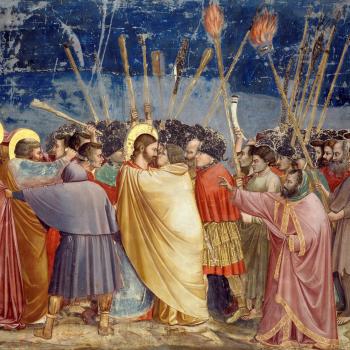Lots of people think of creation as something that happened a long time ago at the Big Bang. And because they do, they also think of the universe as a thing that exists alongside God, with him occasionally sticking his finger in work a miracle or maybe tweak the DNA to make a tyrannosaurus.
Thomas does not see creation that way. He insists that creation is right now, right where you are. God is actively sustaining you in being. Without his present, conscious act of willing you to go on being right this very second, you (and everything else) would simply cease to be. He didn’t just hit the cueball at the Big Bang and then wander off, only to check in now and then and see if Moses had been born so he could get his little Redemption story under way. God has sustained All That Is in being throughout every nanosecond and every square inch of spacetime from the first instant till now and will do so till he brings about a new heaven and new earth.
No. Really:
-De Veritate 5.2 ad 6: “This action [creation] of God must not be compared to the action of a craftsman building a house, for, when his action ceases, the house still remains; it should rather be compared to the sun’s lighting up the air. Consequently, when God no longer gives existence to a creature, whose very existence depends on His will, then this creature is reduced to nothingness.”
-Commentary on Hebrews 1.2.30: “Just as the house ceases coming into existence when the builder ceases to act, and
just as the air ceases to be illuminated when the sun no longer shines; so, when the divine power is removed, the being, the coming-to-be and the substance of every creature is removed.”-Commentary on Colossians 1.4.44: “If God took his power away from us, all things would immediately cease to exist.”
-De Potentia Dei 5.1: “It must be admitted that things are preserved in existence by God, and that they would instantly be reduced to nothing were God to abandon them.”
In short, if God wanted to destroy the world, he would not have to do anything. He would have to stop doing something.
Chesterton got this. So did St. Francis of Assisi. And so both of them felt in their bones a sense of living gratitude to God for keeping everything in being:
If a man saw the world upside down, with all the trees and towers hanging head downwards as in a pool, one effect would be to emphasise the idea of dependence. There is a Latin and literal connection; for the very word dependence only means hanging. It would make vivid the Scriptural text which says that God has hung the world upon nothing. If St. Francis had seen, in one of his strange dreams, the town of Assisi upside down, it need not have differed in a single detail from itself except in being entirely the other way round. But the point is this: that whereas to the normal eye the large masonry of its walls or the massive foundations of its watchtowers and its high citadel would make it seem safer and more permanent, the moment it was turned over the very same weight would make it seem more helpless and more in peril. It is but a symbol; but it happens to fit the psychological fact. St. Francis might love his little town as much as before, or more than before; but the nature of the love would be altered even in being increased. He might see and love every tile on the steep roofs or every bird on the battlements; but he would see them all in a new and divine light of eternal danger and dependence. Instead of being merely proud of his strong city because it could not be moved, he would be thankful to God Almighty that it had not been dropped; he would be thankful to God for not dropping the whole cosmos like a vast crystal to be shattered into falling stars. Perhaps St. Peter saw the world so, when he was crucified head-downwards.
So did Jesus who, even as he faced betrayal and death, chose to celebrate a rite called Eucharist and offering nothing but thanksgiving to the God he trusted would multiply and amplify still more Being and Goodness out of the greatest act of life denial–the murder of God–in history.











